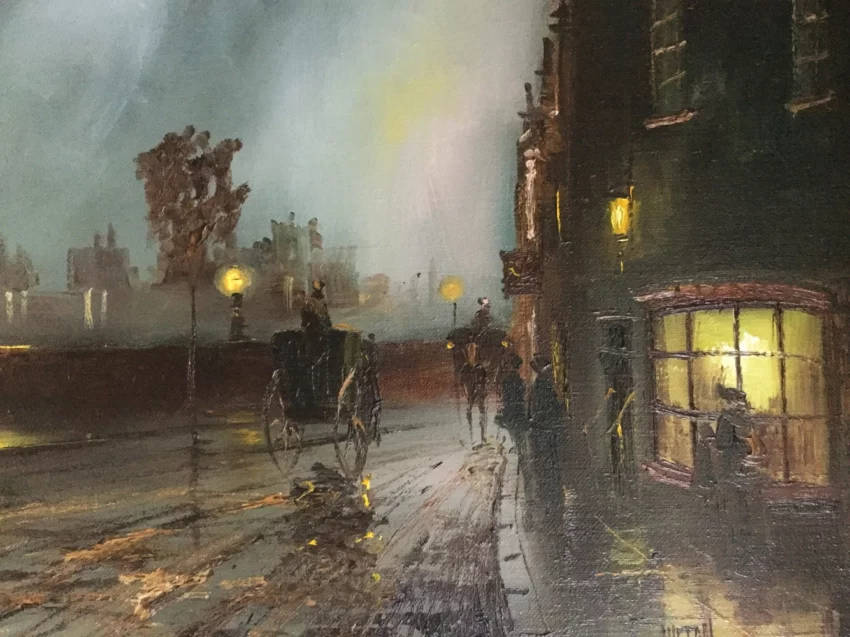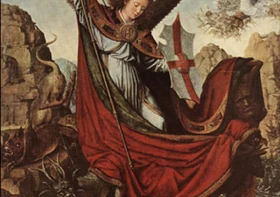The Final Case (Novel Teaser)

Painting by Unknown
A series of yellow street lights lined Kent Lane, cutting large slices of darkness out of the thick London air. Beneath their piercing rays, a heavy fog slowly patrolled the slumbering cobblestones, and all about, angels whispered anxious prayers heard in the creaks of the old homes, the hum of the telephone wires, and the sighs of the Autumn winds. Danger was close, growing closer at nearly 145 km/hr.
On cue, the police van tore through the peaceful suburb, shattering the whole scene as though painted on stained glass. Its lights threw scrambled rainbows in every direction, its siren sent shock waves through the air, and its sheer momentum left in its wake a whirlwind of angels tangled with fog. Inside, Charlie Burn lay flat with two men on either side. He struggled under the velcro straps to contort his arm enough to read his standard-issue watch. It read 0256.
“Christ, it’s late. Albert couldn’t wait until morning to send you chaps?”
The two policemen exchanged looks above him. The younger of the two, a twenty-something dressed in a uniform large enough for him to hide in but not quite so large as to hide his insecurities, turned to him with a face of apprehension. “Just try to relax, Charlie. We’ll be there in less than five minutes.”
“Good golly, Rupert Bear! What a great idea!” Charlie raised his voice with a child’s enthusiasm. “Why don’t you share with the gang where this little adventure of ours will take us, and I’ll do my very best to relax and enjoy the great big hug of these restraints.”
The rookie felt the familiar flush of embarrassment creep up his neck, filling his ears with warmth. He looked to his partner for help, but the other officer had already shifted to face the small, beeping screen on the van wall trying to conceal his smile.
Charlie knew he won, which actually did help him to relax. In his forty-eight years on the force, he never once let a colleague get the better of him, and the only one that ever came close was his boss, detective chief superintendent (DCS) Albert Shore. Even now, seventy-seven years old and long retired, Charlie could still tango with the best of ‘em, not that many tried. Charlie was 6’ 3” and, although quite slender, age had not yet robbed him of his staggering strength. Yet, however impressive his wit and brawn, his detective skills always stole the show. Never before had a detective solved so many high-profile crimes in his career as Charlie, and seldom few could match his effortless style. He was known to toy with his perpetrators, victimizing them in the same fashion they victimized others. Poetic justice was the name of his game, and he liked to play dirty.
On one occasion, Charlie was assigned to the case of the infamous rapist Jack Turner, an eccentric millionaire socialite whose M.O. it was to buy entire gated subdivisions on London’s East side, lock his kidnapped girls in one or other of the houses, allow them to escape and seek refuge in neighboring houses but only to fall back into the cold, grimy hands of his equally high-class cronies living there. After that house’s owner had his share, another escape was staged with the same results. This sick game of cat and mouse only lasted a few weeks before most girls would give up trying to escape and eventually, through abuse bonding, willingly take up residence with, or even marry, one of the men. The girls they grew tired of (along with the ones who wouldn’t break) were properly disposed of—though this was never proven in court—and fresh faces were brought in to keep up with the steady demand. A proper revolving door of horror. Having discovered through the realtor which neighborhood Jack and his villainous posse lived in, Charlie sent fabricated jury duty summons to each of the houses. He waited until Jack and his co-conspirators passed through the courthouse metal detectors on the selected court date to make the arrests. Jack was loaded, loosely cuffed, into a police car whose driver intentionally left the door unlocked. When Jack slipped out of his cuffs and made his inevitable break-for-it, he tried to hijack another car passing by. He was instead met with a badge in his face and a gun to his chest. The undercover cop made his arrest in similar fashion. This was repeated three more times before Jack finally realized that, on their arrival to the courthouse, Charlie had blocked off public traffic on that block and enlisted every copper on the force to drive in circles around the courthouse in their civilian vehicles. Four counts of attempted grand theft auto and four counts of evading the police were added to his rap sheet which, with the rape charges, brought his sentence to ninety-eight years behind bars with no chance of parole. Jack died in his prison cell but not before a few of Charlie’s more appreciative, perhaps indebted, inmates showed him how real men welcome a gal to the block. Charlie also had a private word with the Judge concerning the girls. To this day, he receives dinner invites from a dozen lovely ladies living in a dozen lovely houses located in a lovely gated community on London’s East side.
Another time, a masked bandit was seen hauling off truckloads of maize from old man Wesley’s fields in the dead of night, one of only four maize farms in the London area. When Charlie heard of this, he reached out to his connection in the Food Standards Agency (FSA) who broadcast over the BBC radio that an outbreak of the flesh-eating virus, Feihteziam tarptfad, had infested the maize fields of London and that anyone who has been in contact with locally-grown corn in the last two weeks should report to the William’s Virology Institute for immediate examination and treatment. They were further instructed to bring a sample of the corn they purchased for testing purposes. Only one person actually turned up to the abandoned confectionery dressed up as a doctor’s office, and the maize he brought with him tested positive for the baking soda that Charlie dusted Wesley’s fields with the week prior. His name was Jesse Rayborne, and in his panic over the virus, not once did he stop to consider that London’s maize harvesting season was a full month away, meaning no local maize had yet been sold that year. Charles took great joy in later visiting the perp in prison. He took with him his constant companion, his Sheffield Bowie, and with it, etched the name of the virus into the blank wall opposite Jesse’s sink and mirror. Jesse watched on in silent horror, praying this wasn’t a warm up for something a little more personal. However, when he was finished, Charlie turned around, tipped his hat to Jesse with a smile, and left the cell. On his way out, Charlie stepped into the director’ office to request a favor. For the next year and six months, Jesse saw only “daft prat maize thief” in the mirror and ate only maize in the cafeteria. As for old man Wesley, he never had a customer buy his whole crop before; didn’t know why anybody would. Nevertheless, it sure made life easy, and it felt good to help supply his local penitentiary.
Unfortunately, no man is perfect, especially detectives. God is keen on balancing the decks of people who throw too much in the pot. Charlie, for one, never scored many points in the friends and family department. He was a functional alcoholic with no cat, no place for it to drag him, and no company to look on if ever it did. The only space he could conceivably call home was his daughter’s apartment on 725 Kent Lane—that is, whenever her pity reached that intolerable level where turning him away felt worse than allowing him to sleep in the shed out back (which was almost always the case). Even the Queen in her opulent palace was never so content as Charlie was in his little shack with a bottle of wine. After all, such adroit detective work, everyone knew, was only possible for the monomaniac, the hermit living under a singular rock. That old, wooden shed was Charlie’s rock, the rock under which he made investigations of his lovers, made love with his investigations, and made war with everything between. Well, everything save for a handful of fellow detectives whom he half-way respected and, on occasion, tolerated long enough for them to begrudgingly surrender their toughest investigation. In fact, Sherlock Holmes, nearing death, was rumored to have once paid a visit to Charlie’s shed wherein they drank Old Highland, smoked pipes, played chess, and regaled each other with tales of old, their most brilliant work, until the break of dawn. Before he left, Holmes handed Charlie a list of his cold cases, the crimes that slipped through his fingers and into—never back out of—his tortured mind. Holmes died the next day, and although he would deny it up and down, many hold Charlie responsible for the mysterious deaths of Holme’s chief suspects in those cases. Some speculated that perhaps Charlie regarded those cases as not his to solve; that in bringing those men to legal justice, he would be robbing a dead man. Whatever the case, there was no doubt in anyone’s mind that Charlie possessed the will or the means to resolve those criminals, if not their crimes. Such was his respect for Holmes.
On especially quiet nights, before the golden rays of dawn invade the cracks of his shed, Charlie could sometimes hear Holme’s voice, distant but clear. Sometimes it was a word of wisdom. Other times, a pointed jest. This morning, it was a stern warning.
“You may be retired, but you are not yet dead, my friend. Your final case awaits; the most treacherous man is loose. Fail to find him and death will find you.”
Dedicated to G. K. Chesterton for giving us the every-inspiring Father Brown.



Leave a Reply